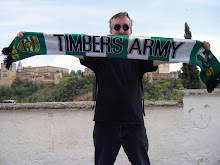
(Contains Spoilers)
In many ways this is the first real post-911 American science fiction film. The horror genre already has 21 Days Later by Danny Boyle (an Englishman) and George Romero’s fourth installment in his “Living Dead” series, Land of the Dead, but Steven Spielberg is the first American director to truly capture the neurosis, dread, and fear of contemporary life in the wake of a cataclysmic event. Spielberg and screenwriters John Friedman and David Koepp echo the events of September 11th with calculated expertise, first igniting our fascination as the strange storms come roiling into view above Jersey, then funneling our horrible interest into outright fear as the first Martian machine uproots from its concrete prison beneath Cruise’s feet and unleashes destruction. Those scenes of mob mayhem are executed skillfully and seem tainted with deja vu. The Calamity of Hurricane Katrina, though obviously unintended due to the fact that it happened long after the film’s production, also came to mind several times as Cruise and family joined the ranks of the refugees. But many of the scenes involving the human exodus fleeing from the towering metal machines fluidly stalking our cities and countryside reminded me of WW2 film footage or snapshots—trees on fire, streets littered with debris and rubble, people disoriented with the soot of death heavy in the air. I kept thinking of Warsaw in flames and of the long dark night cast over Europe as the Third Reich’s own infernal machines pulverized the earth and its soldiers harvested the “other” for slaughter. During the scenes where the refugees attempt to flee on the ferry, images of the Jews were also ever-present in my mind. The film reminded me that much of human history could be viewed as a series of exoduses, escapes, and flights from one calamity to the next.
Spielberg’s take on H. G. Wells’ classic (and brilliant) novel is unarguably flawed, but there are so many fascinating and perverse images and themes here that it is impossible to dismiss. Upon my second viewing (I originally saw it in the theater), the film’s strengths (its visual design, apocalyptic atmosphere, Spielberg’s willingness to disturb) and weaknesses (questionable performances, heavy-handed desire to turn the End of the World into some sort of therapy session for Cruise and his family) become more apparent to me. The most cringe-inducing weakness is no doubt the film’s hackneyed and saccharine ending. Yet, the conclusion—with Cruise and family reunited to begin a brand new day—is an appropriate (albeit clumsy) dénouement of the film’s coherent and focused themes of maintaining the unity of the family at all costs and the belief in the restoration of the social order; a belief in the social order. Bad though it may be, I found the finale far more palatable than the misguided endings to Spielberg’s Artificial Intelligence: A.I. (a film I like very much despite several flaws) and Minority Report (a film I enjoyed up until the last twenty-minutes or so). Perhaps I simply found War of the Worlds’ Dr. Phil influenced finale to be a bit more agreeable considering it only lasted a minute or so, instead of the dreadful, overlong endings I suffered through for both A.I. and Minority Report.
Although I’ve disliked many of his films and have problems with even the ones I do enjoy outside of Jaws and Close Encounters of the Third Kind (arguably his best films), I find Spielberg more and more interesting as time goes by. There’s no doubt that he’s in touch with humanity’s shadow and the dreadful things we’ll do when faced with adversity. He’s fascinated with our darker nature. But I never get the sense that he’s in touch with his own shadow self. For all his cinematic wizardry and his sure-footedness in obtaining some great performances from his actors, his films (I’m talking about the “serious” ones like Schindler’s List and Saving Private Ryan) remain antiseptic and simplistic beneath their blitzkrieg exteriors and relish in documenting unimaginable bloodshed with the utmost “realism” and technical accomplishments. I’ve heard that Spielberg’s latest, Munich, does plunge us into a character’s heart of darkness effectively, so perhaps I’ll have to rethink all of this once I’ve seen it (hopefully next week).
Until then, I’ll stick with Spielberg’s “entertainments.” A few critics routinely dismissed War of the Worlds’ middle section with Cruise and Dakota Fanning (who plays his daughter) hunkering down in the cellar with former ambulance driver Tim Robbins, while the blood harvest rages up top, as a ponderous, murky, and meandering interlude. It dragged down the pace of the popcorn blockbuster too much. I couldn’t disagree more. I found it, upon second viewing, to be the black heart of the film. Cruise’s murder of Robbins as a way to restore order to his fractured family is disturbing, depraved, and fascinating by its implications. It’s a moment of genius when Fanning’s character slowly comprehends what her father has done; that what’s been unleashed down in that dank cellar may be worse than the machines themselves. It may not equal anything in Michael Haneke’s stark apocalyptic film, Time of the Wolf, but it’s rare that an American blockbuster nowadays would even hint at the lengths many would go to keep up appearances.

2 comments:
Best review yet of the film. You nailed it. [I found some parts of the film terrifying - and that's saying a lot from me for a Speilberg flick!]
And thanks for the lead on "Time of the Wolf." Never heard of it. It's "in the cue" for rental.
jc
Hey, thanks. I absolutely agree with you. I never expected to feel so uneasy and horrified by watching a Spielberg movie. Well, intentionally that is. I know it's flawed, and I'm sort of saddened to see it make a lot of Top Worst lists of the year--though I have a feeling that has more to do with the questionable Mr Cruise's public hysterics than the movie itself--but I stand by the film.
Post a Comment